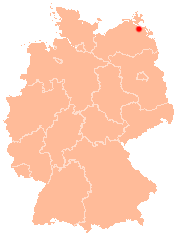Ernst Moritz Arndt University of Greifswald
|
|
| Ernst Moritz Arndt University of Greifswald | |
|---|---|
| Missing image EMAU-seal.png Seal of the Ernst Moritz Arndt University of Greifswald | |
| Data | |
| Established | 1456 |
| Latin | Alma Mater Gryphiswaldensis |
| German | Ernst-Moritz-Arndt-Universität Greifswald |
| Location | Greifswald, MV, Germany |
| Enrolment | circa 10,000 |
| Campus | buildings dispersed small town atmosphere |
| Type | state university |
| Rector | Prof. Dr. Rainer Westermann |
| Address | Am Schießwall 4a 17487 Greifswald Germany |
| Phone | +49-3834-860 |
| pressestelle@uni-greifswald.de | |
| Homepage | http://www.uni-greifswald.de |
| Member of | EUA |
| Map | |
 Greifswald in Germany | |
Ernst Moritz Arndt University of Greifswald is located in Greifswald, Germany, between the Islands Rügen and Usedom, and is the second oldest university in Northern Europe. For a time, it was also the oldest institution of higher education in Sweden and, later, Prussia.
There are currently about 10,000 students studying at the faculties of science and math, medicine, theology, and philosophy/philology. Due to the size of the town of Greifswald, it is rather a university with a town than a town with a university. Before the Second World War, it was among the wealthiest universities in Germany, owning lots of arable land. The university today owns several prestigious art objects, including one of four original 36 lines Gutenberg Bibles from the 15th century and a tapestry from 1554/1556.
| Contents |
Organisation
Like most continental European universities, the E.M.A.U. Greifswald is organised in faculties (German: Fakultät), and among these further divided into Departments (German: Institut). The following faculties exist:
- evangelical theology
- philosophy (and fine arts)
- jurisprudence and economics
- medicine
- mathematics, computer science, natural sciences
History
The University of Greifswald was founded in 1456, due to the great commitment of the mayor (and first rector) of Greifswald, Heinrich Rubenow, in cooperation with Duke Wartislaw IX and Bishop Henning Iven at St. Nikolai Cathedral. Originally, the university consisted of the four traditional divisions: Theology, Philosophy, Medicine, and Law.
In 1604, the university introduced the first centralised university library of Germany. It signed a contract with a book printer from Wittenberg for the amount of 2,000 Gulden, which was extended for another decade for another 2000 Gulden. Due to the disruption caused by the Thirty Years' War, this extension lasted until the end of the 17th century.
In Germany, there are six older universities: Heidelberg (1386), Cologne (1388), Erfurt (1392/1994), Würzburg (1402/1582), Leipzig (1409) and Rostock (1419).
It was named for Ernst Moritz Arndt in 1933.
Alumni
Notable Professors and Lecturers
Nobel laureates
Johannes Stark (1874 - 1957) received the Nobel Prize in Physics in 1919 (see Nobel Prize Website (http://nobelprize.org/physics/laureates/1919/index.html)) "for his discovery of the Doppler effect in canal rays and the splitting of spectral lines in electric fields" during his time at the University of Greifswald.
In 1939, Gerhard Domagk (1895 - 1964) received the Nobel Prize in Medicine (see Nobel Prize Website (http://nobelprize.org/medicine/laureates/1939/index.html)) "for the discovery of the antibacterial effects of prontosil".
Others
- August Hermann Cremer, Lutheran theologian
- Friedrich Loeffler, medicine
- Michael Succow, alternative Nobel Prize
- Peter of Ravenna, law
- Johann Oldendorp, law
- Johannes Hadus, humanist
- Hermann von dem Busche, humanist
- Gustav Nachtigal, explorer of Africa
- Ernst Moritz Arndt, politician and patriot
- Gustav Mie, physicist
- Klaus Fesser, physicist
Notable Students
- Friedrich Ludwig Jahn, gymnastics educator
- Otto von Bismarck, German politician
- Hermann Löns, poet
- Theodor Billroth, medicine
- Ferdinand Sauerbruch, medicine
- Thomas Thorild, a Swedish poet and philosopher
- several thousands of Swedes during the time belonging the Kingdom of Sweden
- Johannes Bugenhagen, Protestant reformer of Denmark and Pomerania
- Ulrich von Hutten, humanist
- Ernst Moritz Arndt, politician and patriot
- Bengt Lidner, Swedish poet
Croy-Tapestry_Greifswald.png
Institutes, Cooperations
- Alfred Krupp Science College (Alfred-Krupp-Wissenschaftskolleg)
- Max Planck Institute of Plasmaphysics
- Institute of Low Temperature and Plasma Physics
- Nuclear Fusion Study Reactor Wendelstein 7X
- German Federal Institute of Animal Virus Deseases, Riems Island
- Siemens AG, Public Networks
- Technology Centre Vorpommern
- Biotechnikum Greifswald
- Technologiepark (under construction)
- Research Institute of Diabetes, Karlsburg (near Greifswald)
Bachelor Degrees
The EMAU has introduced many B.A. programmes, primarily at the faculty of philosophy. These will finally replace the traditional German "Magister". With the rapid introduction, the cooperation with two other universities, and a special curriculum Greifswald has become a leading university in introducing and implementing the new Bachelor/Master system as proposed by the Bologna declaration.
Partner Universities
European Union:
- University of Aarhus (Denmark)
- University of Aberdeen (Scotland, Great Britain)
- University of Brno (Czech Republic)
- Holbæk Seminarium (Denmark)
- University of Joensuu (Finland)
- University of Klaipeda (Lithuania)
- Lund University (Sweden)
- University of Padua (Italy)
- University of Poznan (Poland)
- University of Latvia, Riga (Latvia)
- University of Szczecin (Poland)
- University of Tartu (Estonia)
- University of Vilnius (Lithuania)
Other:
- University of Kaliningrad (Russia)
- University of Saint Petersburg (Russia)
- University of Saskatchewan, Saskatoon (Canada)
- University of Sarajevo (Bosnia)
Also, there are numerous cooperations on the departments' (Institut) level.
External links
- Ernst Moritz Arndt University Greifswald (http://www.uni-greifswald.de)
- City of Greifswald (http://www.greifswald.de)
- Pommeranian Evangelical Church (http://www.kirche-mv.de)
